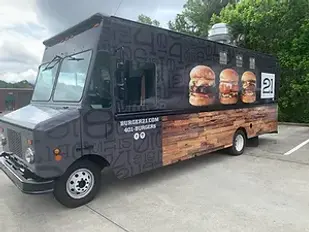How to Start a Food Truck in Georgia: The Ultimate 2025 Guide
One should identify strategic locations and events in Georgia that attract a large crowd, ideal for a food truck business. Networking with other food truck owners in Georgia can provide valuable insights and opportunities for collaboration. Consider the weather and seasonal factors in Georgia when planning the operation schedule and menu for the food truck.


Insurance Coverage for Food Trailers in Georgia
Insurance Coverage for Food Trailers in Georgia
In Georgia, all food trailers must be registered unless used exclusively for agricultural purposes. Noncommercial trailers with a Gross Vehicle Weight (GVW) of 10,000 lbs or less pay a one-time registration fee of $125.
Trailers over 10,000 lbs require permanent registration, costing $800. To register, you will need your driver's license, proof of insurance, the trailer's title, and a completed registration form.
The registration process can be completed at an MVD office. Farm-use trailers are exempt from registration but must still comply with safety standards.
In Georgia, liability insurance from the towing vehicle typically extends to the trailer. However, food truck operators should consider adding collision coverage to protect the trailer’s equipment.
The minimum liability coverage required for a towing vehicle is $15,000 per person and $30,000 per accident.
Summarized Business Regulations for Cottage Food Laws in Georgia
In Georgia, a Cottage Food Operation refers to a small-scale food business run from a home kitchen, producing non-potentially hazardous foods like baked goods, jams, and candies. These operations are allowed to sell directly to consumers at places like farmers' markets or from their homes without requiring a commercial license. However, there are restrictions on income, food types, and sales locations that vary based on local regulations and the specific Cottage Food laws in Georgia.
Example of Successful Food Trucks in Georgia

Uptown Food Truck
American comfort food

The Loaded Burger Food Trucks
Mexican food

Yumbii Food Truck
Taco

How to Register and Title Your Food Truck in Georgia [2025]
In Georgia, all food trailers must be registered unless used exclusively for agricultural purposes. Noncommercial trailers with a Gross Vehicle Weight (GVW) of 10,000 lbs or less pay a one-time registration fee of $125.
Trailers over 10,000 lbs require permanent registration, costing $800. To register, you will need your driver's license, proof of insurance, the trailer's title, and a completed registration form.
The registration process can be completed at an MVD office. Farm-use trailers are exempt from registration but must still comply with safety standards.

Georgia Food Trailer Braking System Requirements
In Georgia, trailers with a GVW exceeding 3,000 lbs must be equipped with a separate braking system.
Electric brakes are most common but hydraulic brakes are also permissible. Trailers under 3,000 lbs are not required to have independent brakes, but they must still meet other safety standards.
Lighting, Reflectors, and Safety Chains Requirements for Food Trailers in Georgia
Georgia law requires food trailers to have two red tail lights visible from 500 feet, amber reflectors on both sides, and functioning turn signals. Trailers must be equipped with at least one safety chain connecting the hitch to the towing vehicle. The safety chain must be rated for the trailer's GVW, ensuring it can safely support the trailer in the event of a disconnect.

![Fast Track to Six-Figure Food Truck Profit in Georgia [2025 Bundle with Guides, Calculators and Full Business Plan]](https://static.wixstatic.com/media/aec654_45c1f1bc7bf04d8180ffef2599148732~mv2.jpg/v1/fill/w_562,h_375,al_c,q_80,usm_0.66_1.00_0.01,enc_avif,quality_auto/aec654_45c1f1bc7bf04d8180ffef2599148732~mv2.jpg)





















